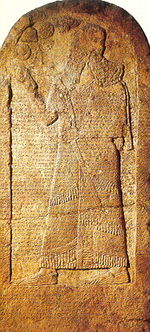
Back معركة قرقور Arabic قرقر دؤیوشو AZB Batalla de Qarqar Catalan Qarqar#Schlacht von Qarqar German Μάχη του Καρκάρ Greek Batalla de Qarqar Spanish نبرد قرقر Persian Qarqarin taistelu Finnish Bataille de Qarqar French קרב קרקר HE
| Battle of Qarqar | |||||||
|---|---|---|---|---|---|---|---|
| Part of the Assyrian conquest of Aram | |||||||
 Kurkh stele of Shalmaneser depicting the battle | |||||||
| |||||||
| Belligerents | |||||||
| Neo-Assyrian Empire |
12 Kings alliance: Hama Israel Aram-Damascus Ammon Qedar Arwad Quwê Irqanata Shianu | ||||||
| Commanders and leaders | |||||||
| Shalmaneser III |
Irhuleni of Hama Ahab of Israel Hadadezer of Aram-Damascus Baʻsa of Ammon Gindibu of Qedar Matinu Baal of Arwad Kate of Quwê Adunu Baal of Shianu | ||||||
| Strength | |||||||
|
35,000, including:[1] 20,000 infantry, 12,000 cavalry, 1,200 chariots[2] |
53,000–63,000 infantry, 4,000 chariots, 2,000 cavalry, 1,000 camel cavalry | ||||||
| Casualties and losses | |||||||
| Unknown | Unknown | ||||||
The Battle of Qarqar (or Ḳarḳar) was fought in 853 BC when the army of the Neo-Assyrian Empire led by Emperor Shalmaneser III encountered an allied army of eleven kings at Qarqar led by Hadadezer, called in Assyrian Adad-idir and possibly to be identified with King Benhadad II of Aram-Damascus; and Ahab, king of Israel.[3] This battle, fought during the 854–846 BC Assyrian conquest of Aram, is notable for having a larger number of combatants than any previous battle, and for being the first instance in which some peoples enter recorded history, such as the Arabs. The battle is recorded on the Kurkh Monoliths. Using a different rescension of the Assyrian Eponym List would put the battle's date at 854 BC.[4]
The ancient town of Qarqar at which the battle took place has generally been identified with the modern-day archaeological site of Tell Qarqur near the village of Qarqur in Hama Governorate, northwestern Syria.
According to an inscription later erected by Shalmaneser, he had started his annual campaign, leaving Nineveh on the 14th day of Iyar. He crossed both the Tigris and Euphrates without incident, receiving the submission and tribute of several cities along the way, including Aleppo. Once past Aleppo he encountered his first resistance from troops of Irhuleni, king of the Luwian state of Ḥamā (called in Hebrew Ḥamāth), whom he defeated; in retribution, he plundered both the palaces and the cities of Irhuleni's kingdom. Continuing his march after having sacked Qarqar, he encountered the allied forces near the Orontes River.[5]
- ^ Gabriel, Richard A. (2002). The Great Armies of Antiquity. Greenwood Publishing Group. p. 129. ISBN 978-0-275-97809-9.
- ^ Gabriel, Richard A. (2003). The Military History of Ancient Israel. Greenwood Publishing Group. p. 47. ISBN 978-0-275-97798-6.
- ^ "Battle of Qarqar". Biblical Archaeology - Maps and Findings. Retrieved 3 July 2024.
- ^ Shea, William H. "A Note on the Date of the Battle of Qarqar." Journal of Cuneiform Studies, vol. 29, no. 4, 1977, pp. 240–242
- ^ ""Qarqar and Current Events", Lofquist, L". Archived from the original on 27 August 2011. Retrieved 22 May 2009.